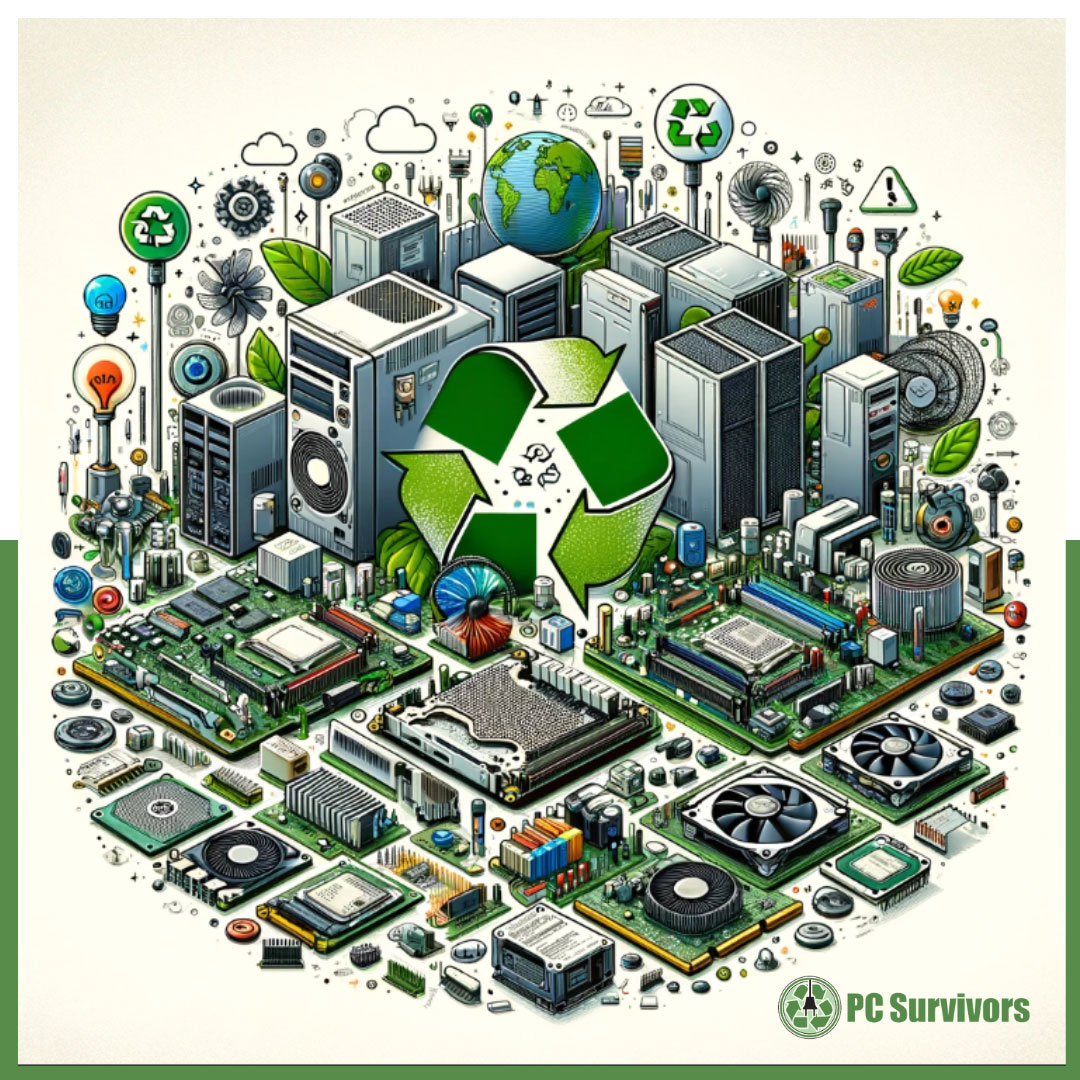Understanding the Electronics Waste Components that Lurk within Your Office Computers
The lifecycle of office equipment, particularly computers, has significantly shortened over the past few years. The increasing speed at which technology evolves has led to an increase in electronic waste (e-waste), posing a significant challenge to environmental sustainability and data security. At PC Survivors, we specialize in helping organizations of all sizes and across diverse industries address these emerging issues with professional electronics recycling and data destruction services.
Knowledge is an indispensable tool in our mission to turn potential e-waste liabilities into opportunities for environmental stewardship and data protection. In this article, we will examine a few of the common forms of e-waste lurking within your office computers’ components, their potential hazards and the ways in which our services can help mitigate these risks.

The Hidden Hazards of Office Computer E-Waste
Office computers are complex assemblies comprised of various components, some of which are hazardous. Let’s take a look at a few of the materials that pose a threat to the environment and human health:
- Lead in CRT Monitors and Soldering: Older computers with CRT monitors contain lead, a toxic metal that can cause a range of health issues, from neurological damage to kidney disease. Lead is also present in the soldering material used on circuit boards.
- Mercury in LCD Displays: Many LCD monitors, which replaced CRTs, contain mercury. This substance is highly toxic even in small amounts. Mercury can damage the nervous system, kidneys and can even cause birth defects.
- Cadmium in Semiconductors: Found in chip resistors, infrared sensors and semiconductors, cadmium is another toxic metal that poses a risk to the environment and human health, particularly affecting kidney function and bone density.
- Brominated Flame Retardants (BFRs) in Plastics: BFRs are chemicals used to make the plastic components of computers less flammable. However, they can accumulate in the environment and living organisms, leading to endocrine disruption and other health issues.
- Lithium-Ion Batteries: Commonly found in laptops, these batteries can cause fires if damaged or improperly handled during the recycling process.
This is just a small sample of the materials within office computers that are potentially dangerous when improperly disposed of. Effectively recycling them is best accomplished with the help of a reputable professional.
Our Approach to Safe Electronics Recycling and Data Destruction
At PC Survivors, we understand the gravity of the e-waste problem and its potential impact on both the environment and information security. Our approach to electronics recycling and data destruction encompasses several key strategies:
Comprehensive Recycling Processes
Our facility is equipped with state-of-the-art equipment and expert staff. We carefully dismantle office computers and safely extract hazardous materials. We ensure that toxic substances are not released into the environment. Materials such as metals and plastics are separated and processed for reuse, which minimizes carbon footprint by reducing the need for new production. Our RIOS and R2v3certifications are a reflection of our strict adherence to industry standards.
Secure Data Destruction
One of the paramount concerns when recycling office computers is data security. Data breaches, identity theft and other cyber events with significant financial and reputation damage can result from improper handling of sensitive information. Our rigorous data destruction protocols are designed to meet and exceed the standards set forth by HIPAA, GLBA and other compliance guidelines. For example, optical media is shredded into 43/50 x 157/1000 pieces, the size recommended in the National Industrial Security Program Operating Manual. Upon request, our clients receive a detailed certificate of destruction, that formally documents the process.
Customized Recycling Programs
We recognize that every business faces unique challenges when it comes to e-waste management. Each recycling program is tailored to the specific requirements of our diverse clients. From on-site data destruction services to convenient e-waste pickup, we design our services to fit seamlessly into your business operations, ensuring minimal disruption and maximum efficiency.
Educating and Partnering with Our Clients
Awareness and education are key components of effective e-waste management. We provide you with the knowledge and tools you need to make informed decisions about e-waste. By understanding potential environmental and health hazards as well as reputation and legal risks associated with improperly disposed electronics, businesses can take proactive steps towards sustainability and compliance.
The Path Forward
The challenge of e-waste is daunting but not insurmountable. Through responsible recycling practices, secure data destruction and a commitment to environmental stewardship, businesses can significantly reduce their environmental impact and safeguard their information. With our team by your side, you can be confident that your e-waste is managed in an environmentally responsible and secure manner, turning potential waste into a force for good. Together, we can pave the way for a more sustainable and secure future, one office computer at a time.
Call 781-924-3071, email info@pcsmass.com or visit our contact page to start effectively managing your office computers and other e-waste today.







